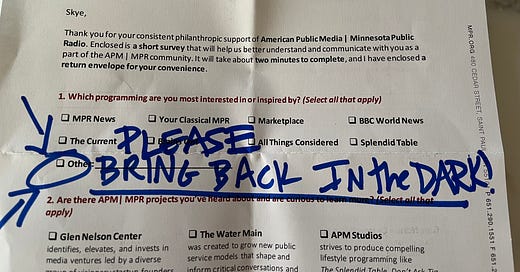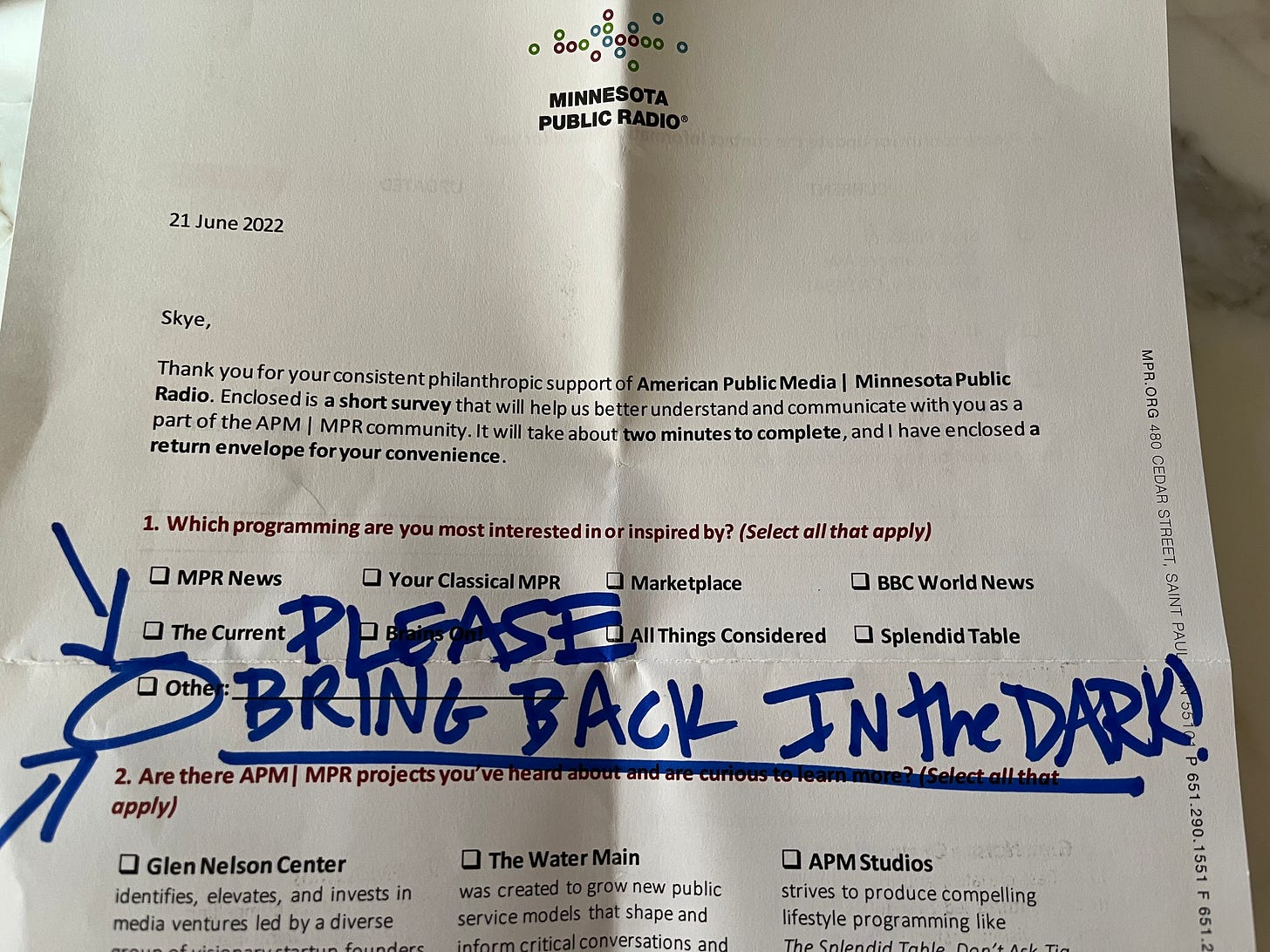

Hello, dear reader!
As you may recall, I had planned to include a particular piece of reporting in this feed as my first “real issue.” Alas, that story continues to consume my life evolve, and I don’t like to rush these kinds of things.
That said, I’m eager to get this newsletter off the ground, so I’ve decided to move ahead with another story that’s been on my mind for weeks.
Earlier this month, the Minnesota Reformer broke the news that APM|MPR had canceled its groundbreaking and award-winning podcast series In the Dark. This news shocked me; I could not — still can’t — understand how a masterpiece of investigative journalism could suddenly come to an end mid-production. Over the course of its two seasons, In the Dark won two Peabody awards, a George Polk Award (the first given to a podcast), sent a case to the U.S. Supreme Court, and likely saved a man’s life. It also connected with audiences in a big way: in 2019 the New York Times reported that its episodes had been downloaded approximately 50 million times.
Over the course of the past year, I had been eagerly anticipating the show’s third season. I remember, during an editing call last summer, asking Hot Pod founder Nick Quah when it would drop; he estimated late fall. But no announcement came. I kept checking the show’s Twitter feed.
Then in March of this year, Current reported on a restructuring that would combine APM and MPR. A key reason listed: “improved efficiency.” A couple of months later, a piece in the Star Tribune revealed that that APM Reports, the division that housed and produced In the Dark, would be shuttered, and on July 6th the Minnesota Reformer reported that the show been canceled and eight staffers were being laid off.


That same day, New Hampshire Public Radio’s Jason Moon tweeted out an excerpt of a letter he’d received informing him that APM|MPR “could no longer sustain support” of the show. According to the note, the organization had “finite resources which should be focused where we can have the greatest impact.” Impact?


Bizarrely, a few weeks earlier, I had received a different letter from MPR, asking me which programming I was most interested in — great timing!
According to sources, the In the Dark team had been halfway through reporting on season three when the team received the news.
So what happened? Were there no other options?
I reached out to APM|MPR with a request to speak with someone about the news. Instead, I was emailed the following statement (bolded text mine):
As a public media service committed to world-class journalism, MPR is dedicated to effectively deploying our resources to create and deliver engaging and inspiring content. Following a thoughtful assessment of our portfolio, we have made the decision to end our support of some APM Reports programs, including In The Dark and The Water Main, and realign others, including Educate, the Investigative Journalism Unit and Call To Mind, within MPR News. As a result, we are eliminating ten positions (two in late May and eight additional positions in July). The affected individuals have been notified, and in keeping with the terms of our contract, we are actively engaged in discussions with the SAG-AFTRA union that represents the talented employees whose roles were eliminated. While programming decisions that result in the elimination of roles are never easy or made in haste, this reorganization will enable MPR to improve journalistic collaboration, achieve greater operational efficiencies, and provide new resources for coverage of topics that connect with our audiences and drive impact. We will accomplish this by adding 12 roles within MPR, including seven within MPR News.
Let’s unpack this non-answer, shall we?
First of all, if killing a world-class work of journalism is how you demonstrate a “commitment to world-class journalism,” I am deeply worried about the future of other APM|MPR employees with journalistic ambitions.
Why is APM|MPR laying off eight “talented employees” in favor of adding seven new roles within MPR News as well as five others? Canning employees and dumping their project mid-production seems like bad business and a future morale problem. (APM|MPR told the Reformer that the employees who lost their jobs are “encouraged” to apply for the open positions, but that’s no guarantee of re-employment and the situation still sucks.)
APM|MPR claims that these changes will help the organization cover “topics that connect with audiences.” Does this imply that In the Dark didn’t connect with audiences? I don’t buy it. And if the actual audience APM|MPR is referring to here is of the ‘big donor’ variety, then why is In the Dark prominently displayed in the organization’s most recent annual report, and referred to as a project the organization is “especially proud of”?
So let’s back up and examine alternatives the organization could have (and perhaps did) put into consideration. The most obvious would have been securing an advertising or sponsorship package for the show. According to Amanda McLoughlin, the CEO of independent and profitable podcast collective and production studio Multitude, it should have been a no-brainer. In an email to me earlier this month she wrote:
Something is badly wrong at MPR if In the Dark is not the station's top earning show. I sell ads on podcasts every day, and I can't picture an easier podcast to sell ads on. Why is the show's production team and audience paying the price for the station's failure to balance its books?”
I also exchanged messages with Rebecca Lavoie, creator of the hit show Crime Writers On… and director of New Hampshire Public Radio’s podcast unit. While she acknowledged that “conversations about budgets and resources are real, and sometimes painful” — she wondered whether APM|MPR had considered monetizing the show via deals with commercial distributors. She wrote:
As someone who has a foothold in the commercial podcast space, I regularly watch serialized shows being shopped and sold for six and seven-figure distribution deals, or monetized through pre-sold, lucrative premiere sponsorships. Some of these shows are as good or better than the best of what public radio can produce, but many more of them are mediocre, formulaic, or just plain awful. I don’t know whether or not MPR considered a commercial distribution deal for In The Dark. Perhaps they did, and no one was interested. That is difficult to imagine, but it’s certainly possible.
If efforts were made to find commercial solutions, I haven’t heard about them (if you have, please reach out). A former employee from the company told me that during her tenure “the marketing team was really small. I think they were smart people who were trying to do what they could with what little resources they had.”
Perhaps compounding the problem, radio entities are often loathe to use anything but donor gifts and grant money to support these kinds of projects. (And to that I say: get over yourselves! If your mission is to bring impactful world-class journalism to a diverse audience, now might be a good time to evolve your thinking.)
Another option could have been finding funds within APM|MPR’s significant financial coffers. According to its latest annual report, the organization boasts an endowment worth $229 million dollars and according to this helpful explainer, it extracts 5% of that number annually for purposes designated by each specific donor (at least a handful of recent gifts were made with investigative journalism or the “advancement of public media” in mind). This past year, 5% would have been worth more than $11 million dollars. When talented peoples’ jobs and exceptional journalism are at stake, isn’t that the moment to dig deep? I’m not arguing that In the Dark should have lasted forever, but this team was midway through its work. What would it have taken to get it over the goal line?
Let’s imagine that senior leadership had actually reached out to their major donors months ago, to let them know that its nationally acclaimed flagship show In the Dark was in peril. Would there have been a collective shrug? To quote Lavoie, it’s difficult to imagine, but it’s certainly possible.
All of this brings me to the question of whether the people at the very top of the organization actually understood the value of what they were letting go. In a detailed piece that chronicled the organization’s cultural and financial missteps over the past couple of decades, Racket journalist Jay Boller wrote that the “overwhelming consensus” from over 20 ex-employees interviewed for the story was that MPR suffered from “an out-of-touch board of trustees running the public institution like it’s a Fortune 500 company; stifling, bloated managerial ranks; and a general attitude of perceived indifference from top leaders toward the people who actually make the product.” (I encourage you to read the whole thing.)
I recently spoke with one of Boller’s sources, former APM Reports producer Alex Baumhardt. A couple of years ago, in the wake of another layoff, she posted a detailed thread on Twitter regarding executive compensation at the company. A quick look at publicly available tax forms had revealed that the CEO of APM was making more than his peer at NPR, while bringing in less than half the revenue. (For his part, Boller had noted that “according to the latest available 990, APMG’s 12 top-earning executives took home a combined $4,063,324 in 2019.”)

“I was like, I can't believe I am fighting tooth and nail for a livable wage at a nonprofit public media company where we're all supposed to have this ‘mission-driven’ attitude,” she told me over the phone. “And these guys are making bonuses the size of my salary.”
Baumhardt’s revelation piqued her curiosity about the organization’s board of trustees, many of whom hail from corporate ventures like Michael Foods, Thomson Reuters, and Aethlon Capital. “These former leaders of major corporations were setting a salary for for [then-CEO Jon McTaggart] that probably made sense to them, given the world that they walk in; it just didn't make sense for a public radio company,” she said.


After Baumhardt’s tweets, McTaggart reached out and suggested they “go for a walk.” According to Baumhardt, the CEO wasn’t prepared to dig into the logic behind his salary or the reasons for Baumhardt’s (and other employees’) frustrations. He did acknowledge their differing points-of-view on the matter but ultimately framed his salary as an “‘it is what it is’ kind of thing.” Toward the end of the conversation, McTaggart said he’d revisit the issue with her at some point, but never followed up. All of this to illustrate that there has been a historical lack of transparency and connection between the higher-ups at the company and those on the day-to-day frontlines.
When I asked Baumhardt why she thinks In the Dark didn’t survive, she started by providing some useful context. First, she said that APM Reports had “started mostly with a grant from the corporation for public broadcasting. A lot of news organizations were starting to make investigative teams because they’d basically shrunk in their newsrooms.” Most of Baumhardt’s projects were supported by grant money, but she remembers that In the Dark had to rely on APM|MPR’s revenue and donor dollars. It never felt like enough.
“I think APM embodies this sense of caution that comes from a company in the upper Midwest where it’s like, we can make investments, but none too big,” Baumhardt observed. “And if you’re going to invest in making a podcast company, you've got to be bold, and they just weren't. It was sort of like a ‘let’s throw cheap paint at the wall and see what happens’ instead of investing in a gorgeous mural.”
So when In the Dark did turn out to be gorgeous, Baumhardt says it caught the organization off guard. “No one at APM had been saying, hey, we need a serialized true crime podcast that looks at systemic failures in the criminal justice system! It was just that [creators Madeleine Baran and Samara Freemark] came up with a really brilliant idea. There are a lot of places where leadership would have done anything to keep it going, but MPR was unprepared to invest in something that ambitious.”
This comment echoed something Matriarch Digital Media founder Twila Dang told me last week (Dang is also a senior producer at MPR News but was not involved in the decision to end the show). “Journalism has always had trouble sustaining itself, particularly when the people making it are employing a high level of rigor. That level of rigor is critical if you want to create a work of integrity, but it’s expensive.”
Dang also pointed out across the industry, people in power increasingly equate a podcast's value with its financial returns. “People pour money into stuff and then expect to see an immediate result. We're seeing people cut budgets for this type of content creation all across the industry. Netflix just canceled Okay, Now Listen, one of its flagship podcasts. There was a point not too long ago where we all thought, ‘Netflix is gonna be the place to be!’ They hired all these people; they put real effort and energy into it. Now they’re shutting stuff down.
Just as I was putting the final touches on this newsletter, I received a few more answers from APM|MPR. Here are the relevant excerpts:
Six of the roles dedicated to supporting In the Dark, full-time, were eliminated.
There have been significant attempts to find funding sources for In the Dark over the past few years. While In The Dark journalism was nationally recognized, the team was only able to produce two seasons in six years and had minimal funding - an allocation of resources that is not sustainable.
We are currently exploring opportunities to find a new home – for the entire enterprise, outside of APMG - and for the talented journalists, within APMG.
And the world turns.
That’s it for me this week. Have a great weekend and see you next Thursday.
Skye







